Photographs: Reuters N Chandra Mohan
The carmaker's labour woes are rooted in its practice of ontractualisation and casualisation of the workforce, writes N Chandra Mohan
The labour turmoil at Maruti Suzuki India Ltd's Manesar facility in Haryana in the summer of 2011 and the violence in July 2012 contrasts sharply with the image of India's leading car manufacturer as a world-class facility.
A decade ago, this writer compared the state of affairs in Maruti's Gurgaon facility with Suzuki's flagship Kosai plant in Japan that produced an awesome 142 cars per employee.
Maruti then appeared to be fast catching up with a productivity level of 97 cars per employee.
To be sure, this difference was partly because Kosai used 13 times more robots than Maruti.
. . .
Maruti's 'low road' to trouble
Image: Officials stand in front of a damaged doorway inside the premises of Maruti Suzuki's plant in Manesar.Photographs: Ahmad Masood/Reuters
But this productivity gap was expected to be narrowed by 2005 on account of labour relations that responded to incentive schemes to step up productivity, reductions in in-house cost per vehicle and material handling, among other things.
After all, this was the much-vaunted strength of Japanese-style practices that were predicated on greater employment stability, seniority-based wages and enterprise-based unions.
A decade later, all of this has changed. In the state-of-the-art facility at Manesar that turns out a car every 50 seconds, impermanence, rather than stability, is the norm.
Sixty-five per cent or more of the workforce is non-permanent comprising temporary workers, trainees and apprentices.
. . .
Maruti's 'low road' to trouble
Image: A worker cleans a parked car at the Maruti Suzuki's stockyard.Photographs: Mukesh Gupta/Reuters
Despite doing regular work on the assembly line, they are denied various benefits that accrue to permanent workers.
Half of their salary is cut if they are late by a few minutes! And they don't have their own union.
What accounts for this radical transformation? Valuable insights in this regard are provided in the recently submitted doctoral dissertation of Annavajhula J C Bose of the Shri Ram College of Commerce, titled "Labour relations in a liberalised industry: A study of Indian automobile workers".
This thesis examines labour relations in Delhi and the National Capital Region in five major facilities -- notably, Maruti Suzuki, Honda Siel, Daewoo Motors, Escorts and Hero Puch, besides 81 subcontractors.
. . .
Maruti's 'low road' to trouble
Image: Workers assemble a car at a Maruti Suzuki plant in Manesar.Photographs: Reuters
Bose's seminal argument is that the dominant way of competing today is on the basis of the 'low road' labouring that involves job insecurity through contractualisation and casualisation of the workforce, autocratic management, low wages and indecent working conditions.
In this milieu, 'high road' or generous labour practices cannot emerge in short-termist employer-driven market places on a generalised basis and be sustained in labour surplus markets in the open economy context of globalisation.
Maruti's transformation -- if not descent -- to the 'low road' of labour practices stems from growing competitive pressures in the marketplace since the late 1990s.
A decisive turning point from the point of view of the management was dealing with the strike of 2000.
. . .
Maruti's 'low road' to trouble
Image: Manesar plant.Photographs: Reuters
At the workplace, the relentless drive to cut costs increasingly saw the replacement of permanent workers by non-permanent workers through measures like voluntary retirement schemes.
At Maruti Gurgaon, the ranks of contract workers steadily increased over this period to 4,000 or 70 per cent of the workforce by 2007.
. . .
Maruti's 'low road' to trouble
Image: A policeman walks inside the premises of Maruti's plant in Manesar.Photographs: Reuters
The share of permanent workers was down to 30 per cent. Contract workers -- or permanent temps -- did regular work on the assembly line and non-production activities at lower wages.
The growing contractualisation and casualisation of the workforce was also reflected at Maruti's plant in Manesar.
The company had set up this facility in 2007 to produce an additional 550,000 cars or 1,152 cars a day on two shifts of eight hours each.
Initially, workers are hired as apprentices and are then taken as temporary workers and later promoted as trainees.
. . .
Maruti's 'low road' to trouble
Image: Workers at the Maruti plant.Photographs: Reuters
Becoming regular workers is not inevitable in this scheme of things!
Maruti Suzuki hoped to de-risk its production by relocating the new production lines that were a fair distance from the old 'troubled' plant in Gurgaon with a fresh workforce, according to GurgaonWorkersNews.
Considering the persisting labour discontent, the big question is whether Maruti was wise in taking the 'low road' to meet its objectives at Manesar since 2007?
Did it succeed in its drive to speed up the work process while creating a sense of impermanence in its workforce?
More importantly, why wasn't it able to obtain cost savings through other means, including new quality and productivity techniques in conjunction with value analysis or value engineering in such a way and to such an extent that there was no need to resort to labour cost cutting?
. . .
Maruti's 'low road' to trouble
Image: A man rides his bicycle past private security guards standing outside the main entrance to the Maruti Suzuki India.Photographs: Adnan Abidi/Reuters
The Manesar turmoil is an inflection point for the company that accounts for half the country's car market.
There are indications that it is planning to make a fresh set of recruitments for the facility. This is a wonderful opportunity to backtrack from the labour practices of the last decade to return to the 'high road' of Japanese-style practices of yesteryear.
Besides meeting competitive pressures, this would truly enable it to complete the transition of becoming a world-class facility.
Towards that end, its pace must be faster by 50 per cent than Kosai.
'Low road' labour practices will not ensure that outcome.

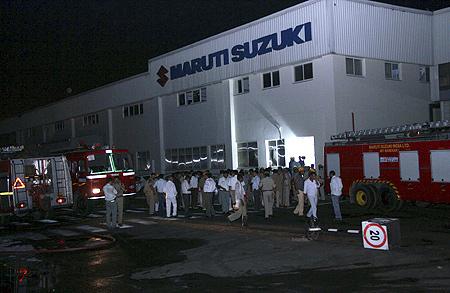
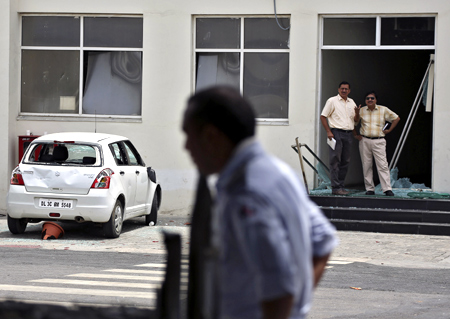
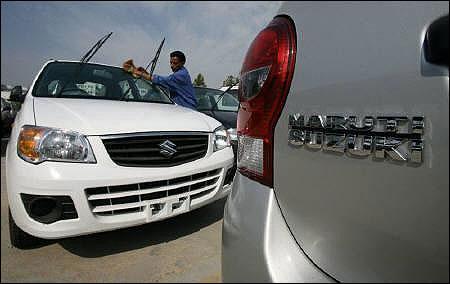
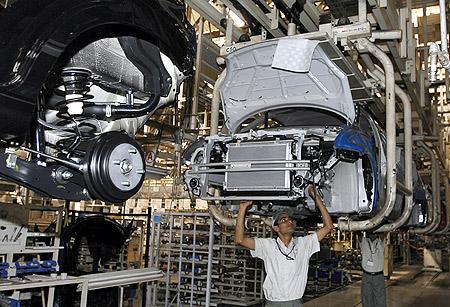
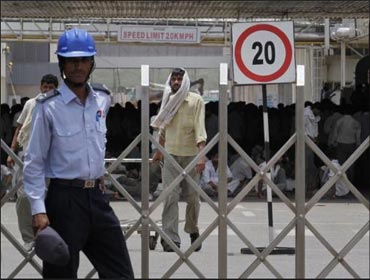
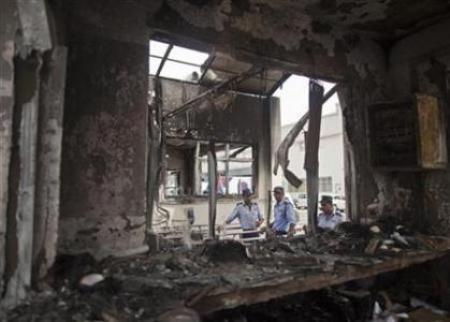
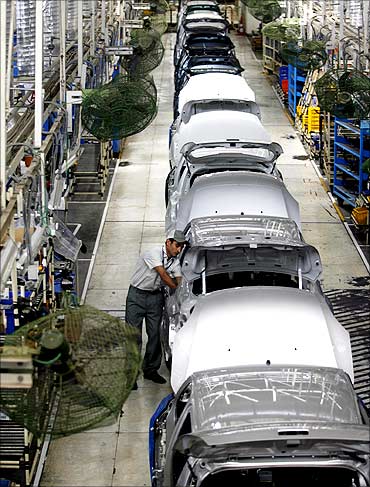
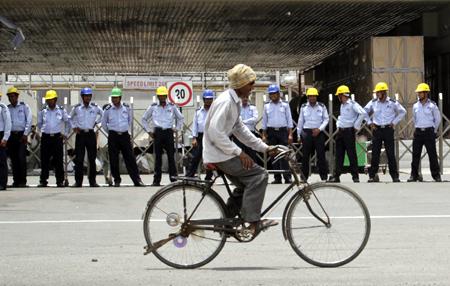

article